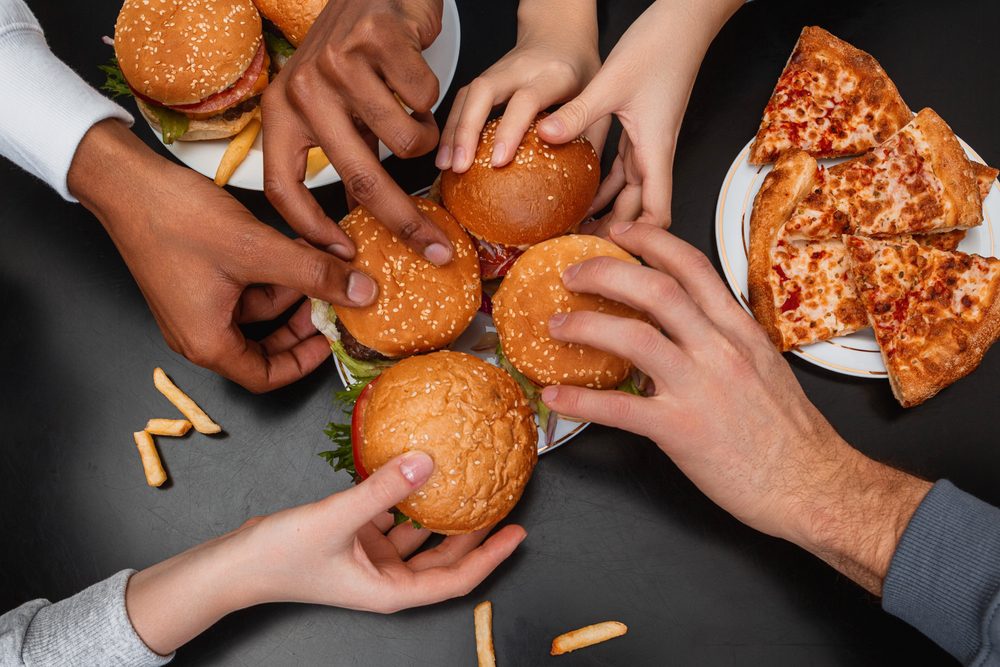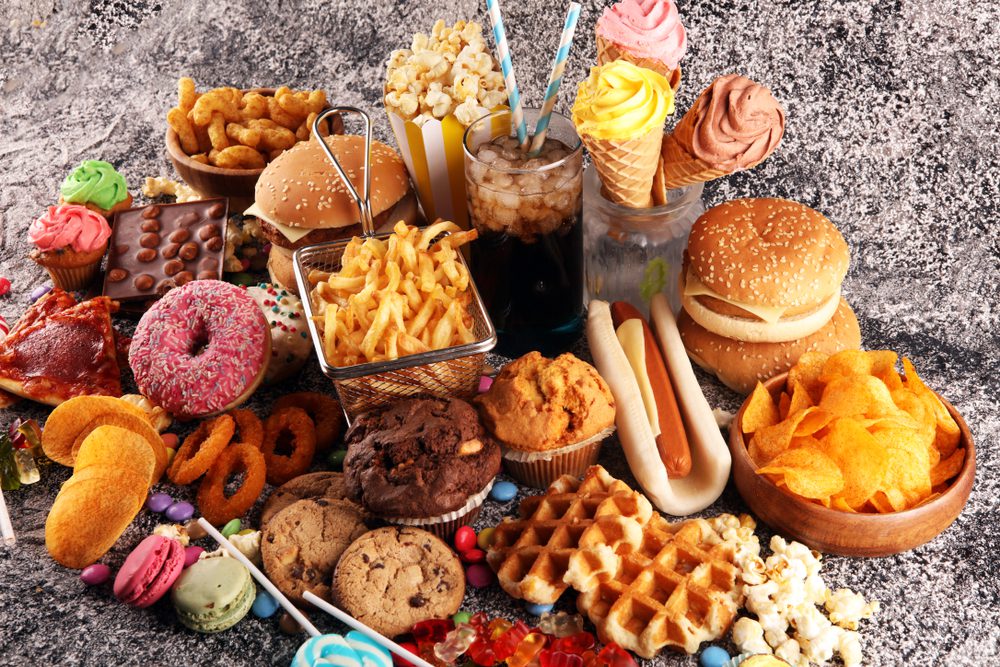Why have we evolved to love the taste of highly processed foods? Let’s see what the science of junk food says!
Admit it: Though you try to eat as healthy as possible, sometimes you feel like nothing compares with some French fries with ketchup and mayonnaise and a deep-dish pizza. It’s okay; most of us feel the same.
An interesting question, though, is why we love unhealthy food. From an evolutionary perspective, you wouldn’t expect a creature to have strong desires for a behavior that’s unhealthy, such as consuming high-calorie foods. We don’t need to study the science of junk food to know that it’s bad for our blood, bad for our hearts, and bad for our physique. However, it tastes great. Why?
So, let’s find out more and see what experts have to say!

The science of junk food: “It tastes great”
It’s true that an unhealthy behavior will usually get weeded out over time, as the members of a species drawn to that behavior won’t live as long and reproduce as much as the healthier ones. However, something singular has occurred in relatively recent human history: the development of culture.
Despite the fact that fries, chips, and burgers are known as some of the most unhealthy choices for a meal, they are still the most sought-after foods in many restaurants, especially in urban areas. According to the science of junk food, many people crave highly processed foods even if they say they don’t.
There are a few reasons behind that. The first one would be that junk foods contain a lot of sugar. We usually tend to associate the word “sugar” with the tiny crystals or the white powdery stuff that we put in coffee, tea, and many other foods to make them sweet. However, that white powder is actually one of the many types of sugar and is called sucrose. While most types are sweet, there are some who aren’t.
Junk foods contain a ton of calories, a lot of added sugar, and a sizable amount of saturated and trans fats. But that’s not all; as you may already know, they are low in minerals, vitamins, and fiber content. Basically, junk foods don’t provide as many nutrients as a healthy meal does.
We don’t need to be experts in the science of junk food to know that deep-fried foods taste better than bland foods. Because of that, most people get hooked on these foods. These sugary, fatty foods cause the brain to release certain neurotransmitters, called oxytocin and dopamine, which induce feelings of pleasure, enjoyment, and relaxation; hence, such foods are called “comfort foods”.
Junk food looks appealing
Another thing that the science of junk foods points out is that the popularity of foods like burgers, cakes, or pastries can also be attributed to their visual appeal. Manufacturers add lots of color additives to make food look more attractive and tempting to consumers, especially children.
The Center for Science in the Public Interest, along with the American Academy of Pediatrics, among other organizations, have long pressured food conglomerates and fast-food chains to rein in marketing to children and to provide healthful alternatives. Burger King is one of the fast-food purveyors to say it will eliminate soda drinks from its kids’ menus.
Moreover, according to the science of junk food, we tend to associate the color of food with its health level. Since antiquity, humans have come to associate bright-colored foods with something that provides many calories and strengthens their immune systems. Just think about it: why does a bright red apple draw us more than a pale one?

We’re programmed to eat a lot
Prehistoric humans didn’t have such easy access to the wide variety of food items we come across on a daily basis. They also didn’t have the convenience of having the essential nutrients (such as fats, carbs, salts, etc.) made available to them as easily as we do today.
So, they made it a habit to eat as much as they could in order to live and protect themselves from the extreme natural conditions, as the science of junk food explains.
We do the same thing today. We’ve inherited the “cave mentality” from our ancient ancestors, and this treat gives us the impression that we can never have enough food that is high in sugar and calories, no matter how mercilessly we guzzle them.
In other words, from an evolutionary standpoint, we’re genetically programmed to eat more than we need, as the science of junk food explains.
How mood affects the habit of eating junk food regularly
When we’re stressed, our body reacts quickly by producing a hormone called cortisol. This hormone increases blood sugar levels, which helps the body’s cells metabolize fats, carbohydrates, and proteins. Moreover, stress also increases hunger.
According to the science of junk food, that’s the reason why, when we’re stressed, we involuntarily tend to choose meals that are high in fats, carbohydrates, and sugar.
The upshot of consuming too many highly processed foods is that they get digested very quickly, resulting in spikes in cholesterol and sugar levels. The science of junk food warns that this can easily snowball into several serious conditions, like diabetes, cardiovascular disorders, obesity, and many other chronic health issues.
Given the fact that junk food is nowhere near healthy, there’s only one question that bothers those of us who take our health seriously but can’t help but love junk food: “Junk food, why are you not healthy?!”

Junk food is fatty, salty, sweet, or all three
According to the science of junk food, rarely do these foods tempt you with complicated or delicate flavors. They pretty much hit you hard with salt, fat, and sweetness. Picky eaters may prefer these simpler flavors instead of the slightly bitter flavor of many vegetables (this seems to turn some people off, especially children).
But the science of junk food points out one more thing, and that’s the fact that it’s more than flavor here. Various combinations of fat and sugar make for textures people like. Fat makes foods creamy and smooth, like butter and ice cream. Corn chips and starchy potatoes cooked in hot oil have a satisfying salty crunch that most of us love.
This doesn’t mean that nutrient-packed foods aren’t appealing, but sometimes the textures of fresh vegetables and fruits take a bit of getting used to if you tend to eat a lot of processed foods.
It’s a habit
Because junk foods are easy to make and find, and a lot of them just taste good, consuming them becomes a habit. Enjoying a bag of fries on occasion or eating a candy bar every now and then can all be part of a well-rounded diet.
However, when you crave junk foods and end up consuming them regularly, you run the risk of becoming overweight and eventually obese, along with developing other serious health issues. Plus, you’re not going to get enough of the fiber and nutrients your body needs for good health.
So, the next time you find yourself staring at a vending machine or standing in line at a burger joint, think about the last time you had junk food. If it were yesterday, think about how your choice could affect your health. If eating highly processed foods becomes a habit, it’s important to consider making some changes; they don’t have to be big, though.
Swap out the soda for fruit-infused water this week, for instance. Then next week, switch from fried chicken on your sandwhich to grilled. Small changes can add up. Also, here’s a cooking book with plenty of healthy recipes!
If you liked our article about the science of junk food, you may also want to read 10 Things That Happen When You STOP Drinking Water.














